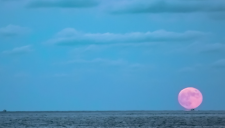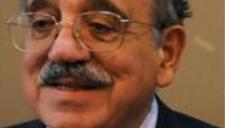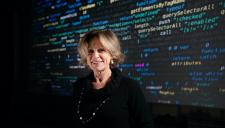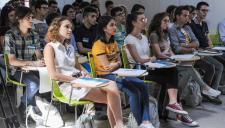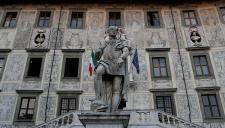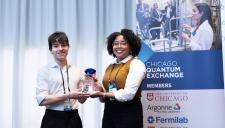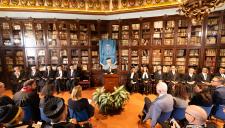I would like to welcome the President of the Region, the Prefect,
the Mayor,
our Rectors,
the civil, military and religious authorities, our lecturing and technical-administrative personnel, our students and all others here present.
Hello and welcome to the inauguration ceremony for the new academic year of the Scuola Normale Superiore, on the 213th anniversary of its foundation, 18th October 1810.
I would particularly like to thank Prof. Rosario Aitala for his presence here today; a judge of the International Criminal Court, he will be delivering a lecture on topics of up-to-the minute relevance that inevitably prompt us to examine our conscience daily.
Today our institution celebrates its 213th anniversary and I am about to enter my penultimate academic year as its Director; I am well over two thirds into my mandate. I think I can say that the method of sharing choices and of respect for the reciprocal roles that I have aspired to adopt in these past few years has been fully reaffirmed as a modus operandi. I would consider this as being one of my contributions to the active life of the Scuola Normale: a modus operandi that I share with the Deputy Director Alessandro Schiesaro, the Deans of the three faculties of the Normale (Andrea Ferrara of the Faculty of Sciences, Stefano Carrai of the Faculty of Humanities and Guglielmo Meardi of the Faculty of Political and Social Sciences) and with the General Secretary of the Normale, Enrico Periti.
Apart from the many specific objectives, the main responsibility that I constantly bear in mind is that of continuing to take care of our institution as if it were a house that is particularly dear to me, since it enshrines precious things both tangible and intangible: not only my past memories as both student and lecturer, but above all the present and the future of the many boys and girls who inhabit it for an important part of their lives, entrusting to it their dreams and ambitions. I would like to hand back the keys to this house and be able to say that everything has been put in order, updated and fully operational: an aim that is undoubtedly unrealistic and too ambitious, since the context in which we move is rapidly changing, as witness the legislative and regulatory framework. In any case, this is the spirit that will be spurring the conclusive stages of my mandate
I hope to succeed in my goal, starting from the confirmation of the role played by the Normale in the Italian university system. By virtue of its very nature, which includes scientific research in its teaching methods, the Scuola Normale has the possibility to move more deftly between the various disciplinary confines and hence to envisage new teaching developments. It is for this reason that we are working towards an enhancement of the curriculum of the interdisciplinary courses. To achieve this aim, a solid initial base of disciplinary courses is needed in order for us to synergise the disciplines that have always been our trademark with more innovative ones. This year we launched two new PhD courses. One is in Computational Cosmology and Astrophysics (COMPAC), which combines scientific knowledge of astrophysics with machine learning and the treatment and exploration of Big Data. The other is in Romance and Italian Philology in the digital turn, which in a network with other important national and international institutions such as the École Nationale des Chartes of Paris and King’s College London introduces digital tools into the study of manuscript traditions and into the analysis, editing and interpretation of literary texts. We thus now have 15 PhD courses, some of which are in collaboration with other academic and research institutions. The teaching curriculum has also been enhanced for the undergraduate course: in the Faculty of Sciences, for example, thanks to the arrival at the Normale of Fosca Giannotti, we have created a preparatory course accessible to all students in the increasingly cogent topics of artificial intelligence in all its possible aspects. Moving on from research training, I recall with pleasure that the research carried out at the Scuola Normale under the guidance of Fosca Giannotti in close collaboration with the University of Pisa and the CNR is designed to identify processes of enhancement of human beings in their relationship with artificial intelligence, with the aim of rendering more transparent the albeit automatic decisional processes of the machines and algorithms that are destined to play an increasingly more pervasive role in our lives.
The Normale can serve as a reference and a stimulus for university training, in synergy with the other Institutes of Higher Education with a Special Status. We are continuing to work in this direction and to attempt to convince the MUR and CRUI of the value of the work, although at the ministerial level such contributions are not always well received and acknowledged, given the ever changing view in national university policies of the role of the Schools of Excellence. Like the rectors of the other Institutes of Higher Education with a Special Status, I am striving to render this specificity that we are expected to promote increasingly more recognised. We are in any case ready to define ourselves and to renew our role, for example by trying out new management and recruitment models.
The Scuola Normale is growing; this is borne out by the fact that, because of the resources granted by the MUR, partly (but not only) thanks to the PNRR, the number of PhD students has now well overtaken that of the undergraduate course, a historic fact considering the relatively recent foundation of the Normale: we now have 370 postgraduate students and 302 students in the undergraduate course, which is taken in parallel with the courses at the Universities of Pisa and Florence. Just a few days ago we welcomed 69 new students from all over Italy, the winners of the admission competition for the academic year 2023/2024; soon we will be welcoming the winners of the PhD competition. We always welcome our new recruits in the awareness of the great responsibility that we bear towards them; it is always with great emotion that we then bid them farewell after they have attained their degree at their university of reference and their master's degree, as we shall be doing in December with those who crossed the threshold of the Normale 5 years ago.
In future, although this will be one of the issues faced by my successor, I also envisage an increase in the number of students on the undergraduate course, partly ensuing from the ongoing investments and renovations for the colleges and the spaces of the Normale, due to be completed in the next few months.
In Florence, the acquisition of Palazzo Vegni is nearing its conclusion and its spaces will shortly be available to the Faculty of Political and Social Sciences. I would like to thank the University of Florence and the City Council of Florence for their full collaboration in this long drawn out procedure. In Pisa, the works are proceeding at the Carducci college; the renovation is being completed of buildings such as the Palazzina di Via Roma, the use of which was conceded practically free of charge by the Tuscany Region, and of a property within the complex of via Della Faggiola, already almost entirely the property of the Normale. All this does not mean that we do not have need for new spaces, given the growth of the teaching body and of the technical-administrative personnel: we are actively seeking new spaces in the historical centre, in the knowledge that we can count on the collaboration of all the territorial institutions.
The Scuola Normale needs to strongly espouse, as it is now only partly doing, a credible plan of economic and environmental sustainability. We must pursue a clear and determined policy that will combine an energy upgrade of our properties with a systematic strategy of communication and education with the aim of minimising waste and reducing the environmental impact and energy consumption. It is for this reason that we are intending to continue with the CAMPUS–SNSostenibile Plan, which, in addition to accrediting the SNS with the MUR, will provide a way of obtaining the funding needed for the realisation of the sustainability plan undertaken. By the end of 2023 all buildings will have undergone a feasibility study and energy analysis. By the end of 2026, when we will have available a three-year history of the buildings' energy consumptions, the energy diagnoses will be updated and further renovation works will be pinpointed. The goal in the coming years will be to attain the maximum energy efficiency possible over the Normale's entire estate, compatibly with the historical characteristics of our buildings and the times of return on the investments envisaged.
Hence we are attempting to take up all the opportunities for growth, including in the economic sense. Although the inflation issue is giving some cause for concern, we have succeeded thanks to the Valutazione della qualità della ricerca or VQR (Research Quality Assessment). A part of our ordinary financing fund has increased in the last few years thanks to a positive assessment carried out by ANVUR, Agenzia Nazionale di valutazione del sistema universitario (the National Agency for the Assessment of the Italian University System). In the period going from 2021, the last year of the old VQR, to 2023, the second year of the VQR currently in force, the bonus quota of our ordinary financing fund increased by 20.7%, having risen from 4,390,330 to 5,301,494 euro. Regarding the Departments of Excellence, the project of the Faculty of Sciences, centred around various research studies of the fundamental type linked to scientific computing and the theory of quantum information, is taking its first steps. As a recognition of the collective planning effort put in by all of our colleagues, we shall be enhancing with internal resources the project submitted by the Faculty of Humanities, in which the Faculty of Political and Social Sciences in Florence is also a participant, and which revolves around a topic area new in the history of the Normale, the History of Religions, with a view to broadening the study of the dialogue between Western European culture, historically at the centre of the research interest of the Faculty of Humanities, and the cultures of other civilisations. For this reason, we have already formalised a direct recruitment, which we hope will be approved by the MUR, of Professor Corinne Bonnet of the University of Toulouse.
The guidelines of the new VQR for the period 2020-2024 contain new and more challenging criteria for the quantification of the bonus quota, with greater attention to technology transfer and the ability to attract international resources. It is an important direction and a challenge that the Scuola Normale fully intends to take up, also in the hope that these criteria will be maintained in the carrying out of future assessments.
The variety of the curriculum needs to be maintained, as reflected by the idea featured in my mandate of a balanced growth of the lecturing body. One significant balancing factor is the number of students; however, I have to say that, thanks in particular to the completely transparent teaching collaboration agreements with the Scuola S. Anna and the University of Pisa, the effective number of attendees at our courses does not correspond to that of the SNS students. After a period of considerable flux, the Faculty of Humanities can now claim to be stabilised, thanks to the recent nomination of Lino Leonardi, full professor of Romance Philology and Linguistics, and the imminent arrival of Alfredo Ferrarin, full professor of History of Philosophy, and of Professor Corinne Bonnet. The Faculty of Sciences needs to shore up its Chemistry and Physics sectors, something that we are thinking about at the moment. In Florence, the Faculty of Political and Social Sciences has witnessed the arrival of Luigi Pellizzoni, full professor of Environmental and Territorial Sociology, Mario Pianta, full professor of Economic Policy, and Lorenzo Zamponi, associate professor of General Sociology. I wish all of these new colleagues a long and fruitful period of service at the Normale.
Although the Scuola Normale is by tradition tasked with stimulating the development of the university system, I feel it my duty to point out here some albeit well known critical issues regarding our country. At the conference of experts of the preceding government dedicated to basic research in Italy, the work group that I co-ordinated presented for Italy a five-year plan for additional resources for Research and Development in the public sector, essential for the stabilisation of the investment at a quota of at least 0.70% of the Gross Domestic Product. Going by the latest data available, if we examine each individual country of the European Union, we see that Italy occupies a median position, with around 0.60% of the GDP allocated in public Research and Development, below the European Union average, much lower than that of nations such as Germany (1.1%) or Iceland (1.2%), or, beyond our boundaries, South Korea, which touches on 1.4%. Given its great scientific and literary tradition, Italy surely deserves more; we scarcely need mention here the many who have contributed to the progress in culture and knowledge, some of whom have gone forth from our own lecture rooms Investment in research and development creates a virtuous cycle which also benefits the economy, and is an immediate way to discourage our best brains from leaving the country, often permanently. If we look at the data presented on 4 July by Luigi Marengo in a meeting at the Accademia dei Lincei, we see that in the period 2008-2019 around 14,000 researchers resident in Italy before the beginning of their PhD moved abroad; however, few PhD graduates from abroad operating in the research sector moved to Italy. Very few Italians have returned from abroad. The percentage of Italian PhD graduates living and working abroad rose in those years from 6% of the cohort of 2010 to 13% of the cohort of 2018. OECD data on the authors of scientific publications show that between 2002 and 2016 those authors with an Italian affiliation that moved to an institution abroad, net of the movements in the opposite direction, numbered 11,000. Of these, many are former students of the Scuola Normale. If we do not invert the current investment policy, we will be defenceless against the phenomenon, already set in motion, of a drain of our best human resources, in whom - as we at the Scuola Normale very well know - the Italian State has invested so much and so well in the preparation for excellence.
Partly to counterbalance these pessimistic data, I would like to remind you all that there have indeed been some positive interventions on the regulatory front: direct recruitment, the mechanisms of career acceleration for the winners of national and international competitive grants, fiscal incentives, and the circulation of ideas created by these brilliant researchers of ours abroad, also producing a virtuous cycle for those staying in Italy. These new regulations, however, operate on too small a number of researchers, albeit with excellence, and further steps will undoubtedly need to be taken.
Indeed, when concrete opportunities arise, we see a return of our “brains”, as witness the return of two former biology students of the Scuola Normale, Elisa Araldi and Federico Rossi: the former a professor at Gutenberg University Mainz in Germany and the latter a researcher at the Wolfson Institute for Biomedical Research at University College London. They have both received considerable funding from Human Technopole (HT) of Milan to carry out innovative research studies on cholesterol and cerebral circuits, at the University of Parma and the Centro di Neuroscienze e sistemi cognitivi (Centre for Neurosciences and Cognitive Systems) of the Istituto Italiano di Tecnologia at Rovereto respectively.
To continue to grow, we need to make ourselves known, and the best way to do this is to present not only our lecturers and researchers but also our students. In this sense 2023 has witnessed a strong impetus to the orientation activities. Participation of our students has increased, above all in those initiatives designed to close the gender gap. We have invested a lot of energy in strengthening our ties with the Italian upper secondary schools, with a series of meetings throughout the country, from Lombardy to Sardinia and Piedmont. At these meetings, our students speak to classes of the upper secondary schools about the Normale and about their own experience here. This initiative runs side by side with the already well established activities of the Orientation Courses, dedicated to providing the tools needed to identify and enhance students' potentiality and passions in order for them to make informed decisions as to their future university studies. The presentation among peers would appear to be a success both for the participants and for our students who run the meetings; I thank the Pro-rector Giulia Ammannati for having lent new impetus and for encouraging new reflections on our orientation model, which we will be continuing to adopt during the academic year and which will see an increase in our activities at San Miniato.
The international, national and local horizon is well defined. Numerous collaborations are ongoing with the research centres to facilitate study and research periods for our undergraduate and PhD students. The Scuola Normale was recently selected by the European Commission as a champion of Erasmus Without Papers (EWP), that is, among the best universities in encouraging progress in the digital management of Erasmus+ student mobility; one of our staff members was invited to the board with the task of disseminating good practice in this field, aiding other institutes of higher education to make further progress in the management of international student mobility flow. I congratulate the entire Internationalisation Office for this prestigious recognition, and in particular the manager of the said office, Elisabetta Terzuoli, who will shortly be leaving us after 38 years in service; I would like to thank her for her many years of dedication to a service so important for our students.
I would like to point out that around 20% of our students of the PhD course chose Italy and the Scuola Normale, and come from countries such as France, Germany, Spain and Japan. This percentage rises to 33% for the Faculty of Political and Social Sciences.
Although the international scope of the Scuola Normale is seen to be growing, we are witnessing a sharp increase in the waiting times for the issuing of residence permits for non-EU students and researchers, an obstacle that greatly complicates, and at times impedes, the regular carrying out of activities. I wish on this occasion to thank the Questore (Police Commissioner) and the personnel of the Questura (Police Headquarters) of Pisa for the willingness and understanding that they have shown in seeking a solution to this problem. I hope that the dedicated help desk due to be installed at the Scuola Sant’Anna will soon be fully operating.
Among the international partnerships is the EELISA network of several European universities, including, in Italy, the Scuola Normale and the Scuola Sant’Anna; the goal is to broaden the educational background and the experiences of students, aiming at the training of a new type of engineer and scientist with interdisciplinary and transversal competences. The first stage of the project is about to end, although a new, more ambitious project, with greater funding, aiming in particular at the creation of joint courses and the issuing of degrees in common, has been funded by the “2023 Erasmus+ European Universities” call.
Regarding this, I would hope for greater support on the part of the MUR, both for the co-funding of these activities that breach national borders and for the surmounting of the innumerable, decisamente troppe, barriers to the legal recognition of qualifications in the European context.
The Scuola Normale is also a member of the international network Scholars At Risk (SAR), thanks to which it has this year set up two extremely important research grants: one to a Russian researcher (in sociology) and the other to a Ukrainian researcher (in political economy), who collaborate side by side at our Faculty of Political and Social Sciences in Florence. The Associazione Amici della Scuola Normale Superiore di Pisa gives support to these activities; my thanks go out to its president, Salvatore Rossi, and to the general secretary of the Associazione, Daniele Altamore, manager of the Scuola Normale.
Our institution maintains a easily recognisable international profile, as testified by the most accredited rankings, such as the Times Higher Education World University Ranking, which just a few weeks ago ranked the Scuola Normale in second place at national level, after the University of Bologna, and in the 168th place worldwide, with a jump forward in the general ranking of 15 places compared to the preceding edition, an advance that is all the more significant if we consider the sizeable increase in the number of universities ranked: up from 1799 to 1904. Our placing is of course even better if we look at more specific indicators, intensive and not extensive, that thus take into account the dimensions of a university, such as the per capita performance indicator of the Shanghai rating, in which we result as being first in Italy and sixteenth worldwide.
There are also facts and indicators that are not exactly scientific ones, but that are important for us, that are an occasion of pride and of reassurance that we are on the right path - facts that I have pleasure in pointing out and sharing with you all on this occasion. Italy prevailed over another 28 nations in the final of Plancks 2023, an event organised by the Associazione Internazionale di Studenti di Fisica (the International Association of Physics Students), gaining both first and second place thanks to two teams featuring our students that defeated teams of young physicists from countries such as France, Spain, Germany and the United Kingdom, counting an overall 200 students from all over the globe. These photos show their joy, which is shared by us and by the University of Pisa, since the quality of their education is the result of our joint efforts. But the Faculty of Humanities also has students worthy of recognition, such as our student Giulietta Guerini, winner of the Stavros Niarchos Fellowship in Classical Art at the Art of Ancient Greece and Rome department of the prestigious Museum of Fine Arts, Boston, to collaborate in the re-displaying of the rooms dedicated to the Etruscan and Italic collection.
I am also desirous to cite some recognitions regarding my own discipline. In September, 4 former students and researchers of the Scuola Normale, Guido De Philippis, Lorenzo Mazzieri, Emanuele Nunzio Spadaro and Maria Colombo, out of 14 winners in total, were awarded prizes at the XXII national congress of the Unione Matematica Italiana, (Italian Mathematics Union), held for the first time in Pisa and organised by the Normale and the Department of Mathematics of the University of Pisa, as a recognition of the high Pisan tradition in this discipline. The congress had a fascinating intermezzo – a theatrical play about the genius Ennio De Giorgi, my mentor and an international figure of Italian mathematics.
At national level, the network of the Institutes of Higher Education with a Special Status (Scuole superiori universitarie a ordinamento speciale), which includes the Normale and the Sant'Anna here in Pisa, IMT in Lucca, GSSI in L’Aquila, IUSS in Pavia and SISSA in Trieste, and soon to take in the Scuola Superiore Meridionale in Naples, must continue to lay claim to the main role of these institutions, as I have already stated. We are fortunate enough to have a close and well established collaboration with the Scuola Sant’Anna and its rector Sabina Nuti, and the privilege of being able to count upon the University of Pisa and its rector Riccardo Zucchi and on the University of Florence and its rector Alessandra Petrucci so as to offer our students a varied, high level curriculum.
In the synergy of education and research that is our distinguishing mark, our curriculum benefits from scientific research centres such as: the NEST Laboratory, directed by Fabio Beltram, which, in collaboration with other actors such as IIT and CNR, is a national and international reference point for nanoscience and nanotechnologies, also in the context of the PNRR; the Biology Laboratory, directed by Antonino Cattaneo, for many years devoted to the field of degenerative diseases of the nervous system.
In the study of Humanities:- archaeological research in the areas of Sicily and Calabria with the SAET Laboratory, directed by Anna Magnetto; research on historical-artistic documentations with the DocStar Laboratory, directed by Flavio Fergonzi.
In the political and social sciences: the studies on protest movements, the neo-liberalism economies and authoritarianisms - topics developed by the newly created Cosmos laboratory, directed by Donatella Della Porta, and by the Istituto Carlo Azeglio Ciampi, the president of which is Mario Pianta. These research centres are increasingly growing in terms of grants issued to young researchers, invitations to international scholars and conferences, as has already happened for the Ennio De Giorgi Centre of Mathematical Research, directed by Andrea Malchiodi.
The preparation of our students is in effect the strong point of the Normale, as it has been in the past and must continue to be in the future. At the Scuola Normale you are taught to adopt a multidisciplinary and transversal approach to research and study oriented towards delivering results, the inevitable stress management and the planning of duties and deadlines – abilities that are utilisable in any type of work environment: national and international, public and private. It is for this reason that, as witness past and recent history, students of the Normale can not only occupy top positions at academic level, but can generate a precious and fruitful exchange of knowledge also outside this context, thanks to the transferability of the competences they have acquired. Hence, together with the already well established initiatives designed for all our students, such as “JobFair” and “JoTTO Fair” - seminars dedicated to technology transfer and meetings with firms and former students in order to acquire information as to situations different from that of Academe – we have set in motion other activities aimed at placement in the world of work, in particular for students of the Faculty of Humanities; we are also investing extensively in new fields connected to the PNRR project, such as research and training dedicated to digital philology.
Regarding technology transfer, I would like to mention our new “Planckian” spin-off (in collaboration with UNIPI), which recently received significant private funding for the use of quantum technologies in the processes of energy storage. In more general terms, besides the already mentioned Departments of Excellence, all the actions of the PNRR are occasions of impact on society and new impetus for research, training and teaching for our students and for the entire research community. I would like to mention in particular:
- the National Centre for HPC, Big Data and Quantum Computing; the Extended Partnerships FAIR - Future Artificial Intelligence Research, NQSTI - National Quantum Science and Technology Institute, CHANGES - Cultural Heritage Active Innovation for Next-Gen Sustainable Society; the Ecosistema di Innovazione (Innovation Ecosystem) THE - Tuscany Health Ecosystem; in addition, the many infrastructural research projects involved at national level. For all their co-ordination work on research topics, I thank the pro-rectors Chiara Cappelli and Tommaso Pizzorusso.
We intend to consolidate the propensity of the Scuola Normale to contribute to the cultural growth of the surrounding territory, undertaking the public engagement mission that is an essential feature of every university: we have always done this with our Library, which is accessible to all students and scholars, not only those of Pisa. Important restoration and upgrading work has just ended on Palazzo dell’Orologio in Piazza dei Cavalieri, one of our main sites, of great architectural and historical value; the work involves the incorporation of the Torre del Conte Ugolino. A long and complex intervention, begun in 2015, which has made more beautiful and accessible a place that is symbolic for us and for the many students and scholars that throng its rooms each year: 62,000 visitors taking out over 20,000 loans.
We also undertake this pledge with the concert season, which this year has reached its 57th edition and which, under the direction of maestro Carlo Boccadoro, is achieving ever greater approval in terms of attendances, with other cultural initiatives such as the Cinema della Normale and the public conferences, and with the more recent but already well established activities such as teacher training in collaboration with the Accademia dei Lincei, and teaching in schools all over Italy through the La Normale a scuola initiative.
But now I would like to mention a project that I consider to be of great value, centred on Piazza dei Cavalieri, one of the most symbolic places of our city: thanks to funding from the Fondazione Pisa, and with the scientific and organisational co-ordination of our lecturer Lucia Simonato, a portal has been set up dedicated to the history and art of the buildings looking out onto this prestigious square. The project has benefited from the virtuous collaboration with various institutions such as the Soprintendenza of Pisa and Livorno, the State Property Office, the State Archives of Pisa and of Florence, and the Istituto Centrale per il Catalogo e la Documentazione (the Central Institute of Cataloguing and Documentation); an agreement currently at the definition stage will shortly be strengthening the dialogue with other authorities. Thanks to this portal, which is finally online and which we can today show here for the first time, it will also be possible to access the inside of some of the buildings of the piazza in small groups accompanied by our students. We are currently working on a soon to be dedicated presentation of this project.
In drawing towards my conclusion, again in relation to Piazza dei Cavalieri I would like to make all our interlocutors aware of the current precarious state of the Church of Santo Stefano dei Cavalieri, which is preventing its use. Partly on account of its position, the church is among the city's buildings of greatest artistic and architectural impact; it was built to a project drawn up by Giorgio Vasari and commissioned by Cosimo I dei Medici in the second half of the the sixteenth century. The Scuola Normale is naturally extremely concerned about the destiny of this church, and offers its full collaboration, scientific and other, in the remedying of this difficult situation.
My hope is that the Scuola Normale will confirm in this academic year too its tradition of centrality in the cultural and scientific life of our country, a tradition that has been passed down through the years by so many personalities that have passed through its lecture halls and taken over its direction. Today I would like to remember in particular Enrico Betti, a mathematician and the Director of the Normale for a long period, from 1865 to 1874, and from 1876 to 1892, who was born in Pistoia on 21st October 1823. The bicentenary of his birth, in a few days' time, will be celebrated by us in Pisa and in Pistoia. In Pisa there will be a meeting on the 20th and an exhibition, due to be inaugurated on the 21st in the rooms of the Library at Palazzo della Canonica: Enrico Betti, l’uomo, il matematico, il politico (the man, the mathematician and the politician). You are all invited to both the meeting and the exhibition.
Another great professor of the Normale, this time from the Humanities, Delio Cantimori, in a public speech which I happened to come across recently, had this to say: «The glory of a Scuola Normale such as this lies not so much in the renown of those who have made it variously illustrious as in its having made possible their freedom of activity and their work». These are words that I have felt to be true for so many years of my life here at the Scuola Normale; hence it is with the gratitude and the responsibility of being part of such an extraordinarily special community and institution that I now declare this academic year open.
Pisa, 18 October 2023.



